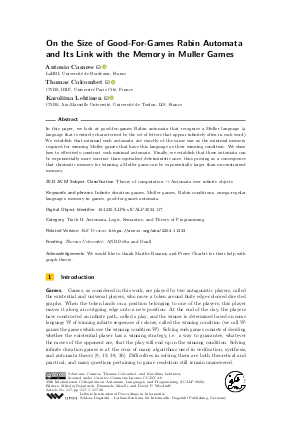@InProceedings{casares_et_al:LIPIcs.ICALP.2022.117,
author = {Casares, Antonio and Colcombet, Thomas and Lehtinen, Karoliina},
title = {{On the Size of Good-For-Games Rabin Automata and Its Link with the Memory in Muller Games}},
booktitle = {49th International Colloquium on Automata, Languages, and Programming (ICALP 2022)},
pages = {117:1--117:20},
series = {Leibniz International Proceedings in Informatics (LIPIcs)},
ISBN = {978-3-95977-235-8},
ISSN = {1868-8969},
year = {2022},
volume = {229},
editor = {Boja\'{n}czyk, Miko{\l}aj and Merelli, Emanuela and Woodruff, David P.},
publisher = {Schloss Dagstuhl -- Leibniz-Zentrum f{\"u}r Informatik},
address = {Dagstuhl, Germany},
URL = {https://drops.dagstuhl.de/entities/document/10.4230/LIPIcs.ICALP.2022.117},
URN = {urn:nbn:de:0030-drops-164580},
doi = {10.4230/LIPIcs.ICALP.2022.117},
annote = {Keywords: Infinite duration games, Muller games, Rabin conditions, omega-regular languages, memory in games, good-for-games automata}
}

 Creative Commons Attribution 4.0 International license
Creative Commons Attribution 4.0 International license







